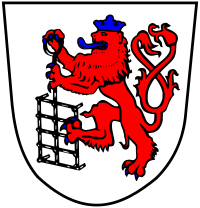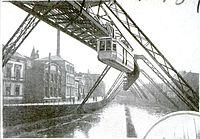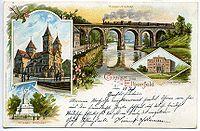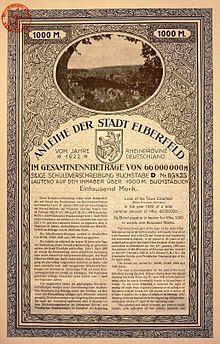- For the town in Indiana, United States, see Elberfeld, Indiana. For the baseball player with this name, see Kid Elberfeld.
Elberfeld is a municipal subdivision of the German city of Wuppertal; it was an independent town until 1929.
History
The first official mentioning of the geographic area on the banks of today's Wupper River as "elverfelde" was in a document of 1161. Etymologically, elver is derived from the old Low German word for "river." (See etymology of the name of the German Elbe River; cf. North Germanic älv.) Therefore, the original meaning of "elverfelde" can be understood as "field on the river." Elverfelde received its town charter in 1610.
In 1726 Elias Eller and the pastor Daniel Schleyermacher founded a Philadelphian society. They later moved to Ronsdorf in the Duchy of Berg, becoming the Zionites, a fringe sect.
The 1820s saw the commencement of the Plymouth Brethren in Dublin, Ireland. This evangelical religious movement spread to the Continent and emerged in Germany chiefly out of Pietist groups through the work of Julius Anton von Poseck, William Henry Darby and Carl Brockhaus. By the 1850s the resultant group had a focal point in Elberfeld and are known to the present as the Elberfelder Brethren. They have branches throughout Germany and Switzerland and beyond. A translation of the Bible into German was produced by this group and is known as the Elberfelder Bibel.
In 1826 Friedrich Harkort, a famous German industrialist and politician, had a type of suspension railway built as a trial and ran it on the grounds of what is today the tax office at Elberfeld. In fact the railway, the Schwebebahn Wuppertal, was eventually built between Oberbarmen and Vohwinkel and runs through Elberfeld.
In 1888 the district of Sonnborn was incorporated into Elberfeld. In 1929 the towns of Barmen, Elberfeld, Vohwinkel, Cronenberg and Ronsdorf became a municipal entity officially called "Barmen-Elberfeld;" in the same year, the unified city administration through a vote of its council members decided to rename the newly incorporated city "Wuppertal." This took place in 1930. Today Elberfeld is the largest municipal subdivision of Wuppertal.
Notable residents
- Greta Bösel (1908–1947), concentration camp guard executed for war crimes
- Arno Breker, sculptor
- Werner Eggerath, East German politician
- Karl Germer, Outer Head of the Ordo Templi Orientis (1947-1962)
- Will Glahé, accordionist, composer, and bandleader
- Carl Grossberg, artist
- Theodor Hausmann (1880–1972), composer
- August von der Heydt (1801-1874), economist
- Eduard von der Heydt (1882-1964), banker
- Walter Kaufmann (physicist), physicist
- Hans Knappertsbusch, conductor
- Erich Koch, NSDAP Gauleiter of East Prussia, Reichskommissar of Ukraine
- Hermann Friedrich Kohlbrugge, minister
- Friedrich Wilhelm Krummacher, minister
- Johann Peter Lange, Protestant theologian
- Else Lasker-Schüler (1869-1945), poet
- Wilhelm Neumann-Torborg, sculptor[1]
- Friedrich Philippi, historian
- Julius Plücker, mathematician and physicist
- Sigurd Raschèr, saxophonist
- Fritz Roeber (1851-1924), painter
- Sir Hans Wolfgang Singer, economist
- Johannes Steele (1908-1988), journalist
- Horst Stein (1901-1989), conductor
- Horst Tappert (1923-2008), actor
- Günter Wand (1912-2002), Conductor
- Carl Wirths (1897-1955), politician
- Sulamith Wülfing, artist
See also
References
- ^ "Beiträge zur Geschichte und Heimatkunde des Wuppertals, Volumes 12-18" (in German). 1966. Retrieved 30 November 2015.



